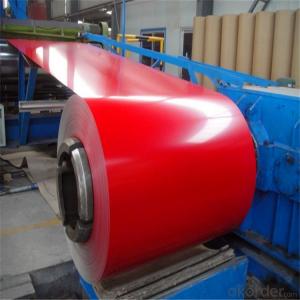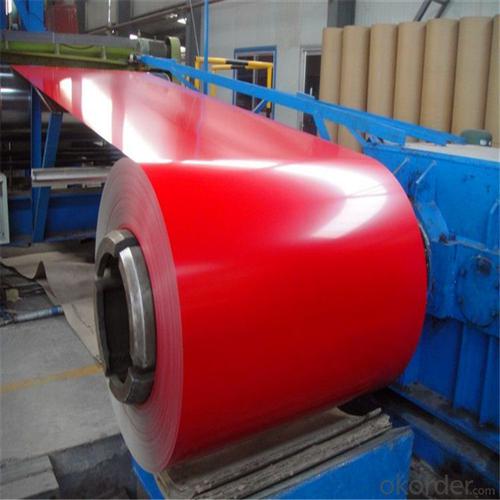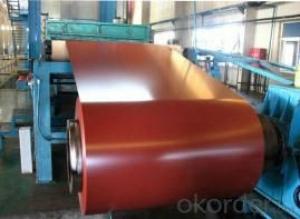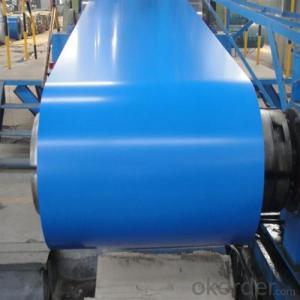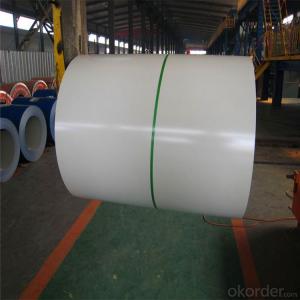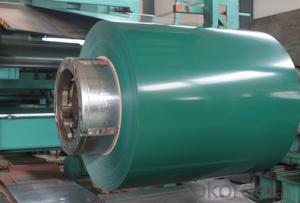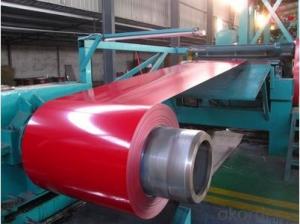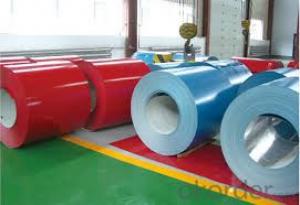0.4 0.5 1.5 2mm Thickness Color GI Coil PPGI Steel Coil DX51D
- Loading Port:
- Tianjin
- Payment Terms:
- TT OR LC
- Min Order Qty:
- 100 m.t.
- Supply Capability:
- 500000 m.t./month
OKorder Service Pledge
OKorder Financial Service
You Might Also Like
Specification
0.5 1.5 2mm Thickness Color GI Coil PPGI Steel Coil DX51D
Description of 0.5 1.5 2mm Thickness Color GI Coil PPGI Steel Coil DX51D
Product | PPGI/PPGL |
Capacity | 5,000 tons/month |
Base material | Hot dipped galvanized steel |
Thickness | 0.2-2.0mm |
Width | 600-1250mm(according to your need) |
Coil Weight | 3-6tons |
Quality | SGCC, DX51D |
Color | RAL No. or customers samples’ color |
Zinc-coating | 30g/m2-180g/m2 |
Coil ID | 508mm/610mm |
Technique | Cold rolled—hot dipped galvanized—color coated |
Painting | Top painting:15~25μm |
Back painting: 6~10μm | |
Tolerance | Thickness: +/-0.02mm |
Width:+/-2mm | |
Shipment time | within 15-45 workdays |
Payment | T/T, L/C at sight |
Packing | Standard export packing |
The special order can be negotiated. | |
Application of 0.5 1.5 2mm Thickness Color GI Coil PPGI Steel Coil DX51D
APPLICATION OF OUR PREPAINTED STEEL | ||||||||||
Construction | Outside | Workshop,agricultural warehouse,residential precast unit | ||||||||
corrugated roof,roller shutter door,rainwater drainage pipe,retailer booth | ||||||||||
Inside | Door,doorcase,light steel roof stucture,folding screen,elevator,stairway,ven gutter,Construction Wall | |||||||||
Electrical applicance | Refrigerator,washer,switch cabnet,instrument cabinet,air conditioning,micro-wave owen,bread maker | |||||||||
Fuiniture | Central heating slice,lampshade,chifforobe,desk,bed,locker,bookself | |||||||||
Carrying trade | Exterior decoration of auto and train,clapboard,container,isolation lairage,isolation board | |||||||||
Qthers | Writing panel,garbagecan,billboard,timekeeper,typewriter,instrument panel,weight sensor,photographic equipment | |||||||||
Products Show of 0.5 1.5 2mm Thickness Color GI Coil PPGI Steel Coil DX51D

Product Advantages
1.With nearly 20 years experience in prepainted steel, accommodate different marketdemands. | ||||||||||||||
2.'Quality first, service first' is our business aim; 'The good faith get respect,cast quality market' is our Business philosophy . | ||||||||||||||
3.Having two series producttion line,with the abbual production capacity of 240000 tons. | ||||||||||||||
4.Exceed International ISO9001:2008&ISO14001:2004 quality and environmental standards | ||||||||||||||
5.Meet with ROHS standard |
Company Information
CNBM International Corporation is the most important trading platform of CNBM group.
Whith its advantages, CNBM International are mainly concentrate on Cement, Glass, Iron and Steel, Ceramics industries and devotes herself for supplying high qulity series of refractories as well as technical consultancies and logistics solutions.


F A Q
1, Your advantages?
professional products inquiry, products knowledge train (for agents), smooth goods delivery, excellent customer solution proposale
2, Test & Certificate?
SGS test is available, customer inspection before shipping is welcome, third party inspection is no problem
3, Factory or Trading Company?
CNBM is a trading company but we have so many protocol factories and CNBM works as a trading department of these factories. Also CNBM is the holding company of many factories.
4, Payment Terms?
30% TT as deposit and 70% before delivery.
Irrevocable L/C at sight.
5, Trading Terms?
EXW, FOB, CIF, FFR, CNF
6, After-sale Service?
CNBM provides the services and support you need for every step of our cooperation. We're the business partner you can trust.
For any problem, please kindly contact us at any your convenient time.
We'll reply you in our first priority within 24 hours.
- Q: Can special steel be used in the production of knives and blades?
- Yes, special steel can indeed be used in the production of knives and blades. Special steels, such as stainless steel or high-carbon steel, possess properties like corrosion resistance, hardness, and toughness that make them ideal for manufacturing durable and high-performance knives and blades. These steels are often chosen for their ability to retain sharpness, withstand heavy use, and resist rust, ensuring the longevity and reliability of the knives and blades.
- Q: What are the key alloying elements used in special steel?
- The key alloying elements used in special steel are typically chromium, nickel, molybdenum, vanadium, and tungsten. These elements are added in varying proportions to enhance specific properties such as corrosion resistance, strength, hardness, and heat resistance, making special steel suitable for various applications in industries like aerospace, automotive, and construction.
- Q: What are the different surface finishes available for special steel?
- There are several different surface finishes available for special steel, including polished, brushed, satin, matte, and textured.
- Q: What are the different methods of testing the quality of special steel?
- There are several methods used to test the quality of special steel. 1. Chemical Analysis: This method involves analyzing the composition of the steel to ensure it meets the required chemical specifications. It helps determine the presence and quantity of various elements, such as carbon, manganese, chromium, nickel, and others, which are crucial for achieving specific mechanical properties. 2. Mechanical Testing: Mechanical testing is performed to evaluate the strength, hardness, ductility, and other mechanical properties of special steel. Common tests include tensile testing, which measures the steel's resistance to breaking under tension, and hardness testing, which determines its resistance to indentation or scratching. 3. Non-Destructive Testing (NDT): NDT methods are employed to assess the quality of steel without causing damage. Techniques such as ultrasonic testing, magnetic particle testing, and liquid penetrant testing are used to detect surface and internal defects, cracks, or discontinuities that may affect the steel's integrity. 4. Microscopic Examination: Microscopy is used to examine the microstructure of special steel, allowing for the evaluation of grain size, inclusions, and other structural features. This analysis can provide insights into the steel's properties and potential defects. 5. Corrosion Testing: Special steel often needs to resist corrosion in harsh environments. Various corrosion tests, such as salt spray testing, electrochemical methods, and exposure to corrosive substances, are conducted to assess the steel's resistance to corrosion and determine its suitability for specific applications. 6. Impact Testing: This method involves subjecting the steel to a high-energy impact to assess its toughness and resistance to sudden loading. It helps determine if the steel can withstand sudden shocks or impacts without fracturing. 7. Heat Treatment Analysis: Special steel often undergoes heat treatment processes to enhance its properties. Heat treatment analysis involves examining the microstructure and hardness of the steel after the treatment to ensure it has achieved the desired properties. Overall, the combination of these testing methods helps ensure that special steel meets the required quality standards, ensuring its suitability for various applications, such as construction, automotive, aerospace, and industrial equipment.
- Q: How does special steel contribute to improving product aesthetics?
- Special steel contributes to improving product aesthetics through its unique properties and characteristics. It can be shaped, molded, and finished in various ways, allowing manufacturers to create intricate and visually appealing designs. Special steel also offers a wide range of colors, textures, and surface finishes, enabling products to have a visually pleasing appearance. Additionally, its high strength and durability ensure that the product maintains its aesthetics over time, providing a long-lasting and visually satisfying experience for consumers.
- Q: What are the main applications of special steel in the chemical processing industry?
- Special steel is widely used in the chemical processing industry due to its unique properties and capabilities. Some of the main applications of special steel in this industry include the manufacturing of storage tanks, pipelines, and reactors. Special steel is resistant to corrosion, high temperatures, and chemical reactions, making it ideal for handling and storing various chemicals and substances. Additionally, special steel is also utilized in the construction of equipment used in the separation, purification, and filtration processes in chemical plants. Overall, the main applications of special steel in the chemical processing industry revolve around its durability, resistance to corrosion, and ability to withstand harsh chemical environments.
- Q: What are the quality control measures for special steel?
- The quality control measures for special steel typically include thorough inspection and testing of raw materials, monitoring and controlling the manufacturing process, conducting various mechanical and chemical tests, ensuring dimensional accuracy and surface finish, and conducting final inspection and certification to meet specific industry standards. These measures are essential to ensure the desired properties and performance of special steel, as well as to meet customer requirements and ensure product reliability and safety.
- Q: What are the applications of high-speed steel?
- High-speed steel has various applications due to its exceptional properties. It is commonly used in the manufacturing of cutting tools such as drills, saw blades, milling cutters, and taps. Its high hardness and heat resistance make it suitable for machining operations on materials like steel, cast iron, and non-ferrous alloys. Additionally, high-speed steel is also used in the production of power tool bits, punches, and dies, where its wear resistance and toughness are advantageous.
- Q: How does special steel contribute to reducing product rejection rates in quality control?
- Special steel contributes to reducing product rejection rates in quality control by offering superior strength, durability, and corrosion resistance compared to conventional steel. This ensures that products made with special steel are less prone to defects, such as cracks, deformations, or surface imperfections, that could lead to rejection during quality control inspections. Additionally, special steel's precise composition and unique properties enable manufacturers to produce more accurate and consistent products, minimizing variations and deviations that could result in rejection.
- Q: How does special steel perform in corrosion fatigue conditions?
- Special steel performs well in corrosion fatigue conditions due to its high resistance to corrosion and fatigue. It is specifically designed to withstand harsh environments and prolonged exposure to corrosive elements. Special steel undergoes various treatments and alloying processes to enhance its corrosion resistance and mechanical properties. This allows it to maintain its structural integrity and performance even under corrosive and fatigue-inducing conditions.
Send your message to us
0.4 0.5 1.5 2mm Thickness Color GI Coil PPGI Steel Coil DX51D
- Loading Port:
- Tianjin
- Payment Terms:
- TT OR LC
- Min Order Qty:
- 100 m.t.
- Supply Capability:
- 500000 m.t./month
OKorder Service Pledge
OKorder Financial Service
Similar products
Hot products
Hot Searches
Related keywords
